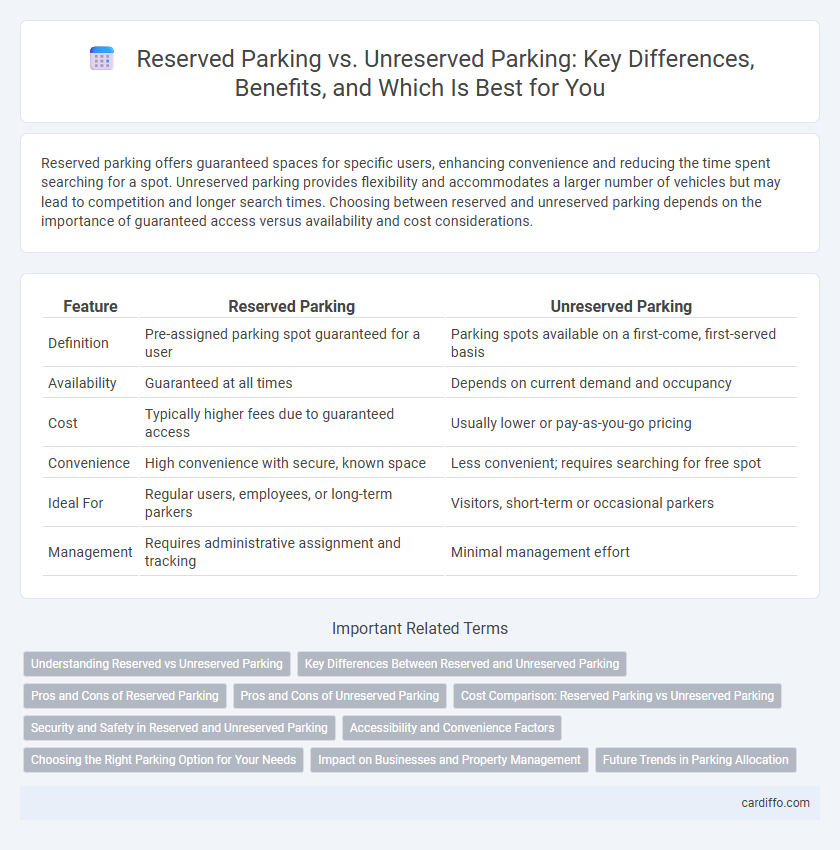Reserved parking offers guaranteed spaces for specific users, enhancing convenience and reducing the time spent searching for a spot. Unreserved parking provides flexibility and accommodates a larger number of vehicles but may lead to competition and longer search times. Choosing between reserved and unreserved parking depends on the importance of guaranteed access versus availability and cost considerations.
Table of Comparison
| Feature | Reserved Parking | Unreserved Parking |
|---|---|---|
| Definition | Pre-assigned parking spot guaranteed for a user | Parking spots available on a first-come, first-served basis |
| Availability | Guaranteed at all times | Depends on current demand and occupancy |
| Cost | Typically higher fees due to guaranteed access | Usually lower or pay-as-you-go pricing |
| Convenience | High convenience with secure, known space | Less convenient; requires searching for free spot |
| Ideal For | Regular users, employees, or long-term parkers | Visitors, short-term or occasional parkers |
| Management | Requires administrative assignment and tracking | Minimal management effort |
Understanding Reserved vs Unreserved Parking
Reserved parking spaces guarantee a specific spot for vehicles, often designated for employees, residents, or VIPs, enhancing convenience and reducing time spent searching for parking. Unreserved parking allows any eligible vehicle to occupy available spaces on a first-come, first-served basis, promoting flexibility but potentially increasing the time required to find a spot. Understanding the distinction between reserved and unreserved parking helps optimize parking management strategies and improve user satisfaction in various facilities.
Key Differences Between Reserved and Unreserved Parking
Reserved parking designates specific parking spaces allocated to individuals or groups, ensuring availability and convenience, often marked by signs or permits. Unreserved parking operates on a first-come, first-served basis, allowing any driver to park without prior assignment, which can lead to variability in space availability. The key difference lies in predictability and exclusivity, with reserved spots guaranteeing access, while unreserved spots offer flexibility but less certainty.
Pros and Cons of Reserved Parking
Reserved parking offers the advantage of guaranteed space availability, reducing the time spent searching for a spot and enhancing convenience for users. However, it often comes with higher costs and less flexibility compared to unreserved parking, which allows users to park on a first-come, first-served basis. This trade-off makes reserved parking ideal for frequent parkers seeking reliability but less suitable for occasional or spontaneous use.
Pros and Cons of Unreserved Parking
Unreserved parking offers flexibility and convenience for spontaneous visitors by eliminating the need for advance booking, often leading to higher turnover rates and efficient space utilization. However, the lack of guaranteed spots can result in frustration during peak times, potentially causing congestion and missed opportunities for users requiring certainty. Businesses and facilities must balance the cost savings of unreserved parking with the possible customer dissatisfaction due to unpredictable availability.
Cost Comparison: Reserved Parking vs Unreserved Parking
Reserved parking typically incurs higher fees due to guaranteed spot allocation and convenience, often ranging from 20% to 50% more than unreserved parking. Unreserved parking options offer lower daily or monthly rates with flexible access but lack guaranteed availability, making them more cost-effective for casual or short-term users. Businesses and residential complexes balance these cost differences by offering reserved spots to premium customers while maintaining unreserved spaces for general use.
Security and Safety in Reserved and Unreserved Parking
Reserved parking spaces offer enhanced security by limiting access to authorized vehicles only, reducing the risk of theft and vandalism. Unreserved parking areas often experience higher traffic and less controlled access, increasing exposure to potential safety hazards and vehicle-related crimes. Implementing surveillance systems and adequate lighting in both types can further improve safety and deter criminal activity.
Accessibility and Convenience Factors
Reserved parking offers enhanced accessibility by guaranteeing a specific spot close to entrances, benefiting individuals with mobility challenges and those needing quick access. Unreserved parking provides convenience through flexibility, allowing drivers to park anywhere available without prior assignment, which suits spontaneous or short-term visits. Evaluating the balance between guaranteed access and flexible availability helps optimize parking strategies for diverse user needs.
Choosing the Right Parking Option for Your Needs
Selecting between reserved parking and unreserved parking depends on factors such as convenience, cost, and frequency of use. Reserved parking assures a guaranteed spot, ideal for daily commuters or long-term parkers who prioritize reliability and time savings. Unreserved parking offers flexibility and lower fees, making it suitable for occasional visitors or those with unpredictable schedules.
Impact on Businesses and Property Management
Reserved parking spaces ensure consistent customer access and enhance tenant satisfaction, directly boosting business revenue and property value. Unreserved parking offers flexibility and maximizes space utilization, appealing to transient visitors but potentially reducing predictability for regular patrons. Effective property management balances these options to optimize occupancy rates and streamline operational costs.
Future Trends in Parking Allocation
Reserved parking spaces are increasingly integrated with smart technology, allowing real-time allocation based on user preferences and demand patterns, improving efficiency and user convenience. Unreserved parking evolves through dynamic pricing and sensor-driven occupancy tracking, optimizing availability while reducing congestion in urban areas. Future trends suggest a hybrid model leveraging AI and IoT to balance reservation flexibility with open access, maximizing space utilization and enhancing sustainability in parking management.
Reserved Parking vs Unreserved Parking Infographic

 cardiffo.com
cardiffo.com